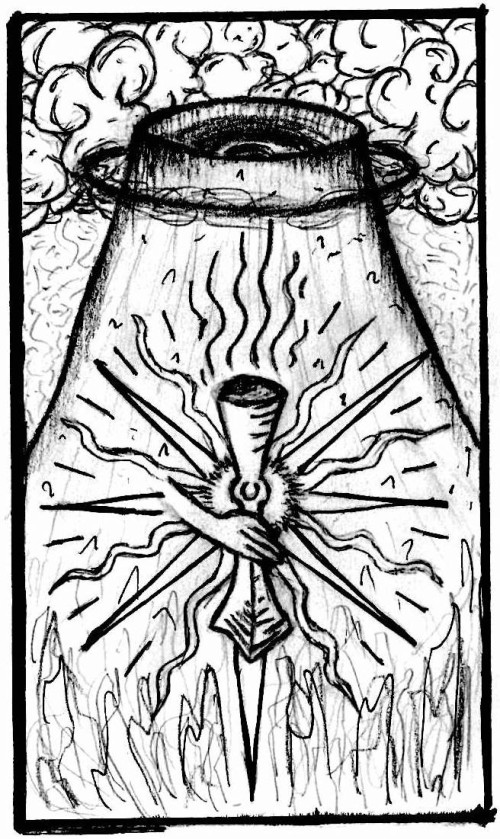If “surveillance” describes that which watches from above (be it the state, the police, a financial institution, or a private data tracker), then “sousveillance” describes that which watches from below (fixing an unflinching eye upon power and its mechanisms).
In Sousveillance Pageant, Emily Abendroth has crafted a stunning “masque” for the abolitionist imagination. If a generic designation is useful for this poet’s novelesque defiance of genre, then “masque” fits the bill. It suggests pantomime and play, disguise and public scandal, while chafing at the segregation of dance and critique. Shelley’s great “Masque of Anarchy” comes to mind, with its clarion alarm to arouse the “many” toward insurrectionary ends—
Rise, like lions after slumber
In unvanquishable number!
Shake your chains to earth like dew
Which in sleep had fallen on you:
Ye are many—they are few!
Abendroth even provides her reader with a literal mask to cut with scissors out of the book’s final pages—“the fugitive, but handsome, Beldings ground squirrel facemask,” to be precise!—by which we are invited to disguise ourselves in order both to scramble the technologies that would otherwise identify us “from above,” be it for predatory, monetary, or punitive ends, while enabling those who choose to wear the mask to recognize one another “from below,” as it were, for “We must watch from below—this you already know. But we must not only watch. We must also watch out for one another and we must act, wreaking havoc upon their notions of a ‘manageable’ populace, testing out every single unexpected site of resistance.”
p.p.s. Please ask me if I will wear the mask.
Answer: I will wear the mask.
There’s an implicit solicitation to the reader here: Please say you’ll join the pageant, dress up for the drag show, be part of the scandal, the conspiracy—the plain old breathing-together—that is, the solidarity.
But what’s a “sousveillance pageant”? I’d say it’s a playful masquerade that belies the difference between the invisible and the flamboyant:
The line between the ‘unseen’ and ‘ostentatious’ has perhaps never been so slender nor the reading of it more bendable, proposing the end of both the non-consensual, roving camera drone and the motion-sensitive doorwell probe alike. (206)
It’s a form that allows one to bear public witness while wresting away from police and capital alike the knowledge-producing power otherwise used to classify, punish, or fleece us. Like a tightly packed coil waiting to spring, Abendroth’s title works like a condensed little poem that communicates the work the book sets out to accomplish—its direct aims, as well as its aimless vagaries. It suggests what Black feminist scholar Simone Browne calls “dark sousveillance” to connote an “imaginative place from which to mobilize a critique of racializing surveillance, a critique that takes form in anti-surveillance, countersurveillance, and other freedom practices” (that’s Browne). And then there’s the “pageant,” suggesting here a public display or carnival that inverts hierarchical social functions, inviting the reader to be a trickster in the game, not just a spectator.
Sousveillance Pageant is also the eponymous name of the book’s central character—often referred to as “The Pageant,” or just plain “Sous.” This isn’t the sort of character one finds in mainstream fiction, but more like an organizing principle devoted to the work of disrupting, if not sabotaging a whole range of surveillance systems. In doing so, “Sous” apprentices herself to a rich catalog of artworks and actions—from The House that Herman Built by Herman Wallace (of the Angola 3) and jackie sumell, to Hito Steyerl’s film November; from Trevor Paglen’s Blank Spots on the Map, to the “Poets’ Security Force” (of the Feminist Economics Department)—creating liberating effects along the way, at once destructive and joyful, from disruptions of facial recognition software to interventions in FISA courts and parole boards. This is a poetics of scrambling the system, the aim of which is to turn “Signal-to-Noise”—the drag name of another of the book’s “characters”—rendering otherwise readable biometrics and ID cards, credit scores and shopping carts, as something more closely resembling “the androgynous mascot for Dadaist wainscoting.” Sous also has a brother, “Inverted Opticality,” who is “permanently imprisoned” and “now stationed in the solitary housing unit, in enhanced confinement for defiant deportment.” Abendroth reminds us of the Orwellian confusion here: “In this context, ‘enhanced’ is always translated as ‘further deprived’—given that every protection one petitions for becomes a cause and justification for amplified institutional retaliation.” Abendroth’s collaborative activism with folks living inside Pennsylvania prisons informs all her writing and, as a founding member of the Coalition to Abolish Death by Incarceration (otherwise known as "life without parole"), as well as the co-founder of Lifelines: Voices Against the Other Death Penalty (see lifelines-project.org), she is committed to abolishing this context.
All the interconnected technologies of identification, policing, extraction, and punishment that Abendroth’s “Sous” desires to disrupt or sabotage are integral to the functioning of both incarceration and capitalism. In this regard, Sousveillance Pageant makes an imaginative contribution to a growing body of interdisciplinary and intersectional work among scholars, activists, and artists committed to “a political vision with the goal of eliminating imprisonment, policing, and surveillance.” This is the work of abolition as it arouses and organizes resistance to “the migration of carcerality from brick-and-mortar jails and prisons to the places in everyday life where surveillance and punitive control dominate other aspects of the state’s enterprise.” 1
Jackie Wang’s Carceral Capitalism (Semiotexte 2018) is useful here because it examines some of those “places in everyday life” characterized by predatory identification, data mining, and algorithmic policing, whose constricting horizons Sousveillance Pageant aims to destroy. In this sense, Abendroth’s writing suggests what Wang refers to as an abolitionist “counter-spell,” or an imaginative form “powerful enough to break the prison’s stranglehold on our imagination.” For Wang, “the prison itself is a problem for thought that can only be unthought using a mode of thinking that does not capitulate to the realism of the prison” (Wang’s emphasis). Both Abendroth and Wang are poets, and I think they’d agree that this “mode of thinking” is nothing less than poetry. No doubt, to argue that the imagination—let alone poetry—has the power to dis-abuse us of the prison’s violent abuses risks hyperbole, mystification, or “enchantment,” as if incarceration were nothing but a fiction born of “mind-forg’d manacles” that could be dispelled by a poem like brain fog. Wang not only takes that risk, she ups the ante when she asks, “Can the re-enchantment of the world be an instrument that we use to shatter the realism of the prison?” That “re-enchantment” calls for the most non-instrumental of instruments, a musical instrument, or a poem whereby the unrecognizable and the over-the-top converge. Such an instrument, of which Sousveillance Pageant is a full-blown illustration, opens a space for thinking about abolition itself as a poetics of doing by undoing, knowing by unknowing, making by unmaking that creates a place in language from which to imagine a world without prisons, and the practices to bring that world into being.
In the postscript to her collection of poems, Exclosures (Ahsahta 2014), Abendroth writes that “one goal of our contemporary poetics must, of necessity, be to sound out the catastrophic and debilitating reverberations” of our contemporary lifeworld. This “sounding out” proposes the poem as an instrument for conducting what otherwise goes unheard, not because it’s not loud enough, but because that “vibrational experience” (Wang’s term) lacks recognizable form. This is where poetry and abolition converge, as they both risk the failure of normative modes of perception, challenging us to unlearn the ways we’re taught to see and hear. “Recognition” is among the unacknowledged problems Sousveillance Pageant takes on. Given our many pleas to be recognized, and the ethical imperative those pleas assume, what happens when that demand echoes those of capital, state, and police? What happens when our commitment to recognize others slips on a willingness to be identified, as the logic of identity gets tethered to motivations less hopeful than individual affirmation?
Abendroth’s response might be something like: Recognition, yes, but not this recognition:
Not the crisp march of hidden cameras and multiplying spywares arising at every corner and wearing away at the vulnerability of one’s edges. Not this copious documentation and ceaseless registration which is aimed always at scrutiny and which operates with an unflagging presumption of permanent guilt or criminality.
Rather,
a form of recognition that would honor our complexities; that would give picture to our unique dexterities, weaknesses, and rigidities; holding us accountable for each, in the belief that we might also transform them.
In her turn away from the transparency necessary for easy identification, Abendroth turns to Zach Blas’s Facial Recognition Suite and the Fag Face Mask, “which poses the power of Queer Opacity, ‘a form of queer politics concerned with the unrecognizable, with cultivating forms of living otherwise’” (that’s Abendroth quoting Blas). Like a strange affirmation of our failure to recognize, this poetics of opacity—complementing that of Édouard Glissant’s Poetics of Relation—is critical to the work of abolition, opening up new spaces of possibility and freedom, and with them, new ways of imagining a future that refuses to capitulate to the realism of the present.
And so, we’re drawn back to the beginning, the orbit of the theatrical pageant, the masque where one’s costume unsettles the accustomed eye determined to see only what has been ordained to be seen:
In other words, you saw something all right, you were audaciously pointed towards it even and yet you still couldn’t make heads or tails of what it was you saw.
Forced into a confrontation with the resolutely inassimilable.
And every single fierce or fabulous, queer or Afro-futurist punk rocker who is reading this page today hardly needs an historical example or elaborate preamble in order to conjure the contours of such means.
It simply means that you, as one part of the world, change the world as it is seen. (196)
Notes:
1 Angela Davis, Gina Dent, Erica R. Meiners, and Beth E. Richie, Abolition. Feminism. Now. (Haymarket 2022).
Sousveillance Pageant by Emily Abendroth, (Radiator Press 2021)


